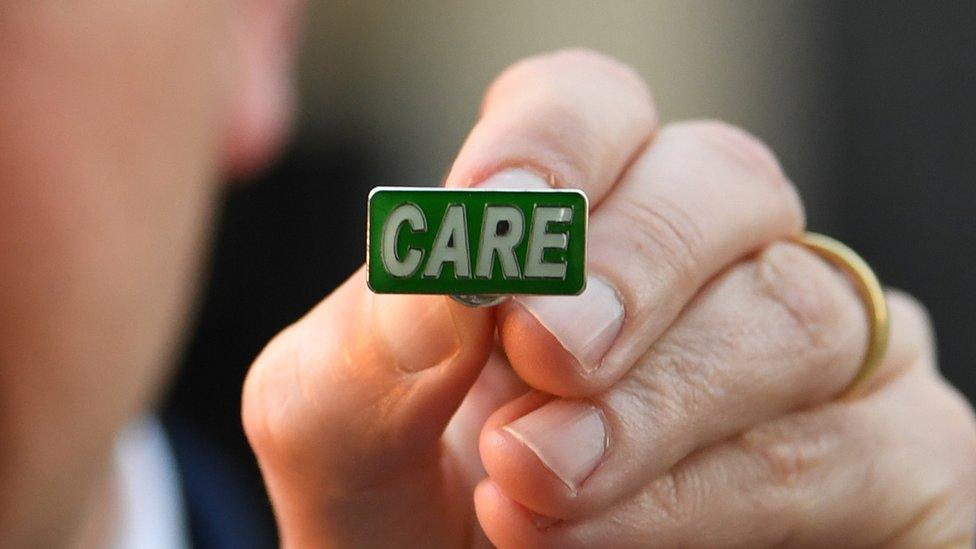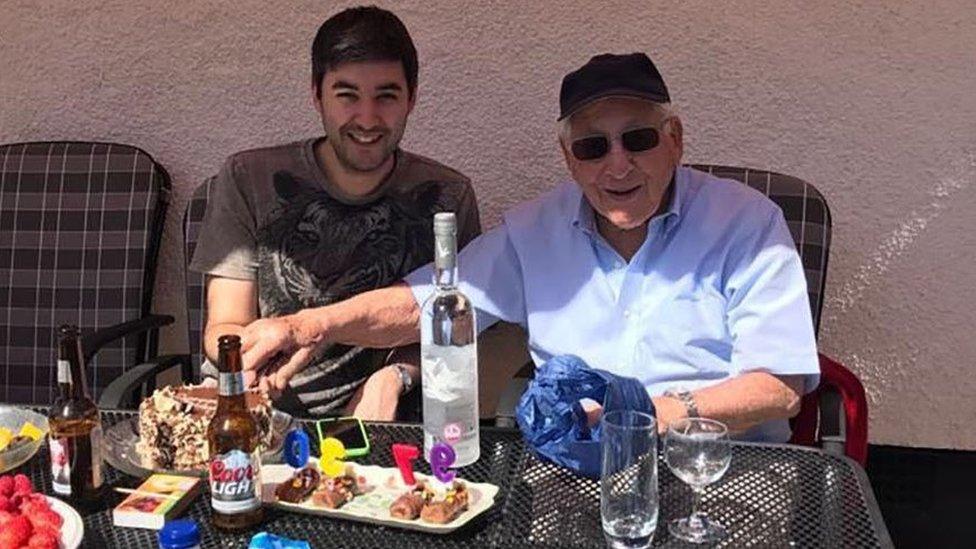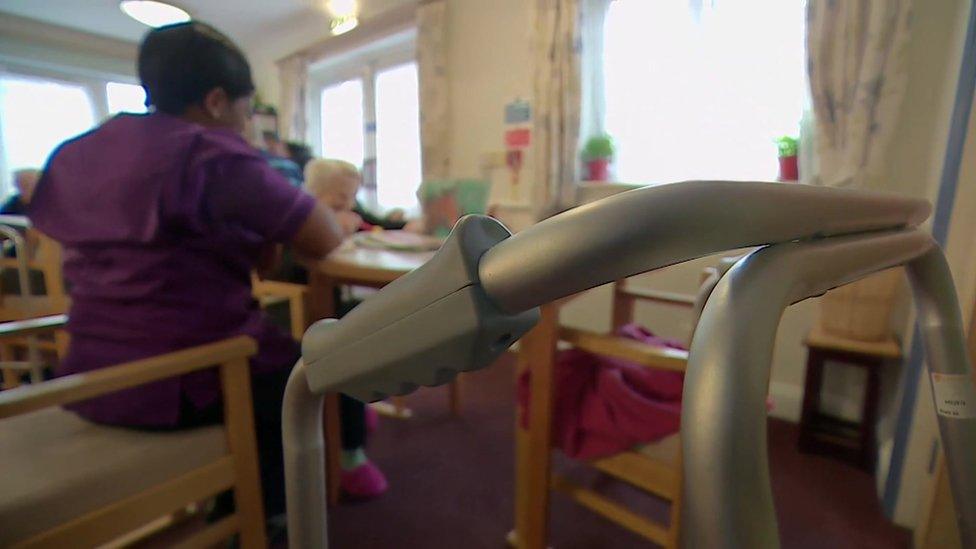Coronavirus: Close family to be allowed to say goodbye to the dying
- Published
Mr Hancock said wanting to be with a loved one at the end of their life is "one of the deepest human instincts"
Close family members will be able to see dying relatives to say goodbye under new coronavirus guidelines, Health Secretary Matt Hancock has said.
He said the UK would introduce new steps to "limit the risk of infection" and allow goodbyes "wherever possible".
Mr Hancock also launched a new network to supply personal protective equipment (PPE) to care home staff.
It comes as the number of hospital deaths in the UK rose by 761 to 12,868.
Many loved ones have been unable to say goodbye to family and friends since stringent restrictions were introduced on life in the UK on 23 March.
Mr Hancock highlighted the death of Ismail Mohamed Abdulwahab, 13, from Brixton, south London. Ismail died alone in hospital last month and his close family were then unable to attend his funeral because they were self-isolating.
Speaking at Wednesday's briefing, Mr Hancock said the reports made him "weep".
"Wanting to be with someone at the end of their life is one of the deepest human instincts," he said.
"It's a moment that will be with you forever. Done right it can help those left behind cope and it brings comfort to those who are dying."
New government guidelines for social care providers, published shortly after the briefing, external, say that care homes should still "limit unnecessary visits" but advises that "visits at the end of life... should continue".
It also outlines how ministers hope to get PPE to care providers most in need - including an emergency 24/7 helpline.


Health Secretary Matt Hancock has made big play of the fact relatives are to be allowed to visit dying family in care homes.
This was already allowed under guidance issued on 2 April, but many care homes have blocked visiting because of concern about spread of the virus, partly fuelled by a lack of protective equipment.
The same applies to hospitals. It has meant many people with Covid-19 have died with no family or friends around them.
Just because a minister says it is allowed, it does not mean it will happen.
On the frontline, staff are under huge pressure and are reluctant to take risks.

Care providers have been calling for more testing and PPE for weeks, amid outbreaks at more than 2,000 homes.
In Scotland, new figures suggest a quarter of deaths linked to coronavirus have occurred in care homes.
In England and Wales there were 217 deaths in care homes by 3 April. That number is known to now be much higher. Twenty-four residents have died after an outbreak at one care home in Staffordshire.
Earlier, the government promised to test care home residents and staff with Covid-19 symptoms as laboratory capacity increases.
At the news conference, Mr Hancock extended the promise on testing to include anyone moving from hospital into social care.
Previous guidance said only the first five residents with Covid-19 symptoms in each care home needed to be tested to confirm that an outbreak was taking place.
England's care regulator, the Care Quality Commission, says it has started contacting care providers to book tests for staff who are self-isolating with coronavirus symptoms.
In response to Mr Hancock's announcements, Labour's shadow minister for social care Liz Kendall said that workers "really need to see action and not just words".
She told BBC News there were sill questions over the government's strategy - such as how those who test positive while in care can be isolated effectively.
And she called for "rapid action" to increase testing and to get more PPE to the front line.

A SIMPLE GUIDE: How do I protect myself?
AVOIDING CONTACT: The rules on self-isolation and exercise
LOOK-UP TOOL: Check cases in your area
VIDEO: The 20-second hand wash

Mr Hancock also announced a "badge of honour" to allow care workers to "proudly and publicly identify themselves" during the pandemic - in a bid to boost public recognition of all those in caring roles.
And he said supermarkets have been asked to ensure social care workers are given the same priority access as NHS staff.
The badge Mr Hancock displayed was in fact launched by Care England, which represents care home providers, in 2019.
Rehana Azam, national officer of the GMB union, said care workers "need more than a badge and a pat on their head to define their precious role in society".
"They need the protective equipment and testing on the front line now to protect their lives," she said.
Meanwhile, Mr Hancock said the restrictions on movement were "starting to work" but warned "we will not lift these measures until it is safe to do so".
Ministers are required by law to assess whether the rules are working, based on expert advice, every three weeks - with the first assessment carried out by Thursday.

Health Secretary Matt Hancock displays the "badge of honour" devised for care workers
Deputy chief scientific adviser, Prof Angela McLean, said there was continuing evidence that the social distancing measures were having an impact on the rate of people testing positive for Covid-19.
The numbers of coronavirus patients in hospital beds have also fallen, she said. On Tuesday, the number fell by 1% across the UK, and by 5% in London.
"We expected everywhere to be the same. That is not exactly what we are seeing," she said.
She said the number of people in hospital in London with coronavirus was falling faster than elsewhere perhaps because cases rose faster in the capital and then people responded to advice more quickly.
NHS bosses have told the BBC that hospitals should be able to cope with an expected peak in coronavirus cases.
In other developments:
Globally, the number of cases has reached two million - with 600,000 in the US alone - according to Johns Hopkins University
US President Donald Trump has been heavily criticised for halting funding for the World Health Organization (WHO)
Germany has announced plans to slowly ease restrictions brought in to tackle coronavirus
Children up to the age of 11 are returning to nurseries and schools in Denmark, which was among the first countries in Europe to impose a lockdown
A pregnant nurse, 28-year-old Mary Agyeiwaa Agyapong, has died in hospital after contracting Covid-19. Her child was alive and well, the hospital said
Tom Moore, a 99-year-old military veteran, has raised more than £8m for the NHS after his fundraising page attracted the attention of thousands of people
And high street retailers Oasis and Warehouse have gone into administration with more than 200 job losses, in the continuing economic crisis
- Published4 April 2020

- Published15 April 2020

- Published15 April 2020
